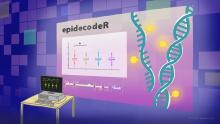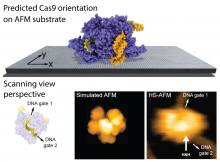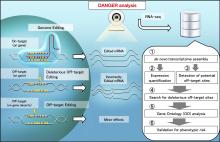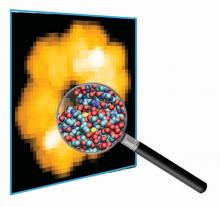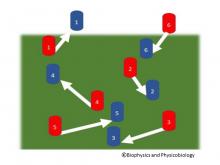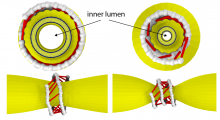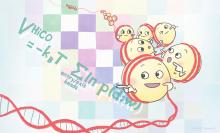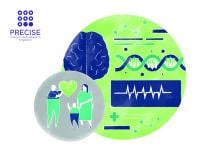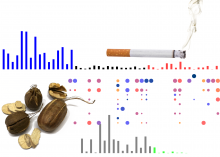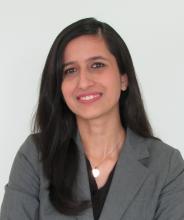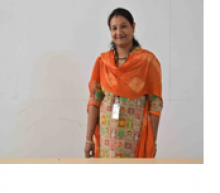Biology Computational biology
News
08 Dec 2023
Researchers at Kanazawa University report in Frontiers in Molecular Biosciences a computational method to predict the placement of proteins on AFM substrates based on electrostatic interactions.
20 Oct 2023
Risk-averse on/off-target assessment for CRISPR editing without reference genome
20 Jun 2022
Atomic force microscopy (AFM) allows to visualize the dynamics of single biomolecules during their functional activity. All observations are, however, restricted to regions accessible by a fairly big probing tip during scanning. Hence, AFM images only the biomolecular surface with limited spatial resolution, missing important information required for a detailed understanding of the observed phenomena.
20 Jun 2022
Researchers at Kanazawa University report in Biophysics and Physicobiology how to optimize high-speed atomic force microscopy experiments on live cell membranes, so that moving objects like molecules can be properly followed from frame to frame.
02 Sep 2021
Researchers at Kanazawa University report in Proceedings of the National Academy of Sciences how a protein molecular motor can chop off a piece of cell membrane. The constrict-and-cut mechanism resembles that of a ratchet motor, and is of importance in processes mediating the entry of particles into cells.
31 May 2021
High-resolution genome structural analyses combined with large-scale simulations show the arrangements of the genome’s spool-like structures affecting gene expression.
07 Apr 2021
New national body established to further research insights, improve patient outcomes and create new economic opportunities for the biomedical technology industry.
06 Feb 2020
A global research collaboration, led by world class institutions in Singapore, the UK and the USA, has developed the most detailed catalogue of mutational fingerprints found in most types of cancers that could help clarify their developmental history and lead to new prevention and treatment strategies.
Events
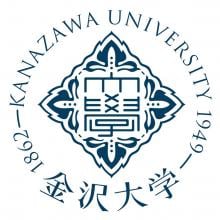
19 Sep 2022 to 21 Sep 2022
The Nano Life Science Institute (WPI-NanoLSI) at Kanazawa University will hold a ‘Workshop on Computational Biophysics of Atomic Force Microscopy – A Lecture Course Approach’ 19-21 September 2022, online.
Researchers
Dr Owen Rackham is an expert in the development of computational approaches for cell reprogramming and disease-gene association.
Dr. Sonia Chotani is a computational biologist working in the area of small open reading frames and RNA translation in human diseases.
Professor Ken's current research mainly focuses on the causes and treatments of neurodegenerative diseases. His lab has developed a nanomaterial-based technology for harvesting autologous neural stem cells from the brain of living subjects.
Dr Yap is currently a senior lecturer and course coordinator for the Bachelor of Medical Bioscience at Monash University Malaysia. She is dedicated to toxin pharmacology and toxicology research. She has strong background in biomolecular modelling, proteomics, immunological and molecular pharmacology of bioactive toxins. She leads the Toxin Pharmacology Research Group. Her research group now focuses on molecular mechanisms of cytotoxin with the ultimate goal of developing next-generation biotherapeutics. Her research works have been featured in prominent media outlets, including the International Snakebite Awareness Day campaign. Besides active in research, she is also an education innovator who adopts various active learning strategies with technology. She teaches undergraduate units with an emphasis on student-cantered learning using the andragogy approach. Dr Michelle enjoys promoting STEM education to the public. She has organized and hosted several workshops and forums to advance the disciplines in medical sciences through research and education.
Dr. Mamta Agrawal
BSc. (Maths, Physics, Chemistry), MSc. (Mathematics),
DCA (Diploma in computer applications)
MCA (Masters in computer applications)
PHD (Mathematics and Computational Biology)
POST DOC (Mathematics and Computational Biology)
completed two research projects: 1. WOS-A (DST New Delhi) 2. Indo-Austria research Projuect (DST-BMWF)
Visited Abrod four countries Thiland, South Korea, Austria, Nepal
Paper Pulication-18
ChpterPublication-1
Book Publication-1
Patent- going on
Giants in history
Sorry, nothing coming up for this discipline


